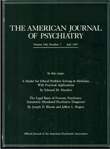Worsening of Obsessive-Compulsive Symptoms Following Treatment With Olanzapine
Mr. A was a 35-year-old man who lived with his parents and suffered from partially responsive schizophrenia and comorbid obsessive-compulsive disorder (OCD). He had previously experienced clozapine- and then risperidone-induced worsening of obsessive-compulsive symptoms. Before treatment with olanzapine and at 4-week intervals, obsessive and compulsive symptoms were identified and rated with the Yale-Brown Obsessive Compulsive Scale (scale range=0–40). In the past 5 years Mr. A's best level of functioning was attained on a regimen of haloperidol, 25 mg/day, plus some combination of antiobsessional drug (Yale-Brown scale score=20). The most recent antiobsessional drug was fluvoxamine, 200 mg/day. On this regimen, before the olanzapine trial, Mr. A's symptoms included compulsive hand washing and his sentinel somatic delusion of “muscles breaking up.”
Olanzapine was started at a dose of 10 mg/day concurrent with Mr. A's other medications, and over a 2½-week period haloperidol was tapered and discontinued. Between weeks 3 and 4 of olanzapine treatment (1 week after discontinuation of haloperidol), accompanied by his mother, Mr. A presented with gross worsening of his OCD symptoms (Yale-Brown scale score=23). His mother stated, “I can't keep him supplied with all of the paper products!” referring to Mr. A's increased hand washing and drying and preference for disposable paper towels and toilet tissue. At week 4 fluvoxamine was increased to 300 mg/day, which was the maximum tolerated. The increase in fluvoxamine, however, did not alter the frequency, duration, or quality of Mr. A's OCD symptoms, and the dose was returned to 200 mg/day at week 10.
Despite the more severe OCD symptoms (Yale-Brown scale score=30 at weeks 12 and 16), Mr. A had a global subjective report of improvement and stated, “I feel more like myself.more awake and energetic.” He expressed interest in continuing the olanzapine trial, and he suggested “behavioral” treatments for his OCD. Adjunctive behavioral treatment had been suggested or attempted for many years without benefit, primarily because of Mr. A's unwillingness to accept this form of treatment. Although his parents were frustrated with the return of previously controlled OCD symptoms, they also agreed with and supported continuation of olanzapine treatment. Mr. A reported increased motivation, and after months of indecision he decided to join a health club (week 11) and entertained the idea of part-time work or school. His psychotic symptoms, including the somatic delusion, remained at a stable baseline.
References
Information & Authors
Information
Published In
History
Authors
Metrics & Citations
Metrics
Citations
Export Citations
If you have the appropriate software installed, you can download article citation data to the citation manager of your choice. Simply select your manager software from the list below and click Download.
For more information or tips please see 'Downloading to a citation manager' in the Help menu.
View Options
View options
PDF/EPUB
View PDF/EPUBGet Access
Login options
Already a subscriber? Access your subscription through your login credentials or your institution for full access to this article.
Personal login Institutional Login Open Athens loginNot a subscriber?
PsychiatryOnline subscription options offer access to the DSM-5-TR® library, books, journals, CME, and patient resources. This all-in-one virtual library provides psychiatrists and mental health professionals with key resources for diagnosis, treatment, research, and professional development.
Need more help? PsychiatryOnline Customer Service may be reached by emailing [email protected] or by calling 800-368-5777 (in the U.S.) or 703-907-7322 (outside the U.S.).

